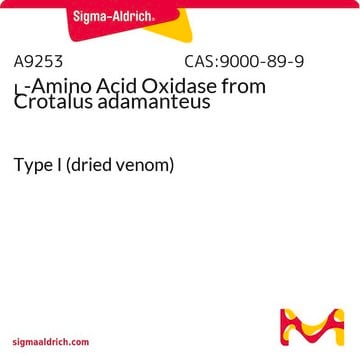S3132
Seleno-L-methionine
≥98% (TLC), powder, IgE expression inhibitor
Synonym(s):
(S)-2-Amino-4-(methylseleno)butyric acid
About This Item
Recommended Products
product name
Seleno-L-methionine, ≥98% (TLC), powder
Assay
≥98% (TLC)
form
powder
color
white to off-white
solubility
H2O: 50 mg/mL
storage temp.
−20°C
SMILES string
C[Se]CC[C@H](N)C(O)=O
InChI
1S/C5H11NO2Se/c1-9-3-2-4(6)5(7)8/h4H,2-3,6H2,1H3,(H,7,8)/t4-/m0/s1
InChI key
RJFAYQIBOAGBLC-BYPYZUCNSA-N
Looking for similar products? Visit Product Comparison Guide
General description
Application
- in toxicity studies in Japanese Medaka embryos
- to study its effects on selenium status indicators in pregnant long-tailed macaques (Macaca Fascicularis)
- to label proteins for single wavelength anomalous dispersion (SAD) phasing
- as a nonchemical stressor to treat Japanese Medaka fish embryos
- to label proteins for Single wavelength Anomalous Dispersion (SAD) phasing
- to study the distribution and inhibition effects of seleno-L-methionine on 4T1 mouse mammary carcinoma
Biochem/physiol Actions
Signal Word
Danger
Hazard Statements
Precautionary Statements
Hazard Classifications
Acute Tox. 3 Inhalation - Acute Tox. 3 Oral - Aquatic Acute 1 - Aquatic Chronic 1 - STOT RE 2
Storage Class Code
6.1A - Combustible acute toxic Cat. 1 and 2 / very toxic hazardous materials
WGK
WGK 3
Flash Point(F)
250.3 - 346.3 °F
Flash Point(C)
121.3 - 174.6 °C
Certificates of Analysis (COA)
Search for Certificates of Analysis (COA) by entering the products Lot/Batch Number. Lot and Batch Numbers can be found on a product’s label following the words ‘Lot’ or ‘Batch’.
Already Own This Product?
Find documentation for the products that you have recently purchased in the Document Library.
Customers Also Viewed
Articles
Antioxidants protect biological systems from oxidative damage produced by oxygen-containing free radicals and from redoxactive transition metal ions such as iron, copper, and cadmium.
Our team of scientists has experience in all areas of research including Life Science, Material Science, Chemical Synthesis, Chromatography, Analytical and many others.
Contact Technical Service












